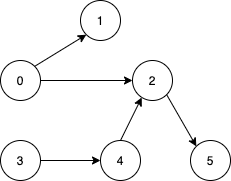2023-05-18 Daily Challenge
Today I have done leetcode's May LeetCoding Challenge with cpp.
May LeetCoding Challenge 18
Description
Minimum Number of Vertices to Reach All Nodes
Given a directed acyclic graph, with n vertices numbered from 0 to n-1, and an array edges where edges[i] = [fromi, toi] represents a directed edge from node fromi to node toi.
Find the smallest set of vertices from which all nodes in the graph are reachable. It's guaranteed that a unique solution exists.
Notice that you can return the vertices in any order.
Example 1:

Input: n = 6, edges = [[0,1],[0,2],[2,5],[3,4],[4,2]] Output: [0,3] Explanation: It's not possible to reach all the nodes from a single vertex. From 0 we can reach [0,1,2,5]. From 3 we can reach [3,4,2,5]. So we output [0,3].
Example 2:

Input: n = 5, edges = [[0,1],[2,1],[3,1],[1,4],[2,4]] Output: [0,2,3] Explanation: Notice that vertices 0, 3 and 2 are not reachable from any other node, so we must include them. Also any of these vertices can reach nodes 1 and 4.
Constraints:
2 <= n <= 10^51 <= edges.length <= min(10^5, n * (n - 1) / 2)edges[i].length == 20 <= fromi, toi < n- All pairs
(fromi, toi)are distinct.
Solution
class Solution {
public:
vector<int> findSmallestSetOfVertices(int n, vector<vector<int>>& edges) {
vector<int> degree(n);
for(const auto &edge : edges) {
degree[edge[1]] += 1;
}
vector<int> answer;
for(int i = 0; i < n; ++i) {
if(!degree[i]) {
answer.push_back(i);
}
}
return answer;
}
};
// Accepted
// 66/66 cases passed (275 ms)
// Your runtime beats 91.92 % of cpp submissions
// Your memory usage beats 89.58 % of cpp submissions (94.2 MB)